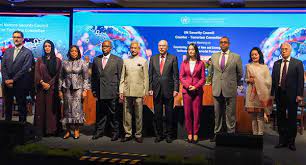UNITED NATIONS, Feb 9: A report of Secretary-General Antonio Guterres on the threat posed by ISIL to international peace and security has taken note of the “Delhi Declaration” adopted at a special meeting of the UN Counter-Terrorism Committee in India last year on combating the use of new and emerging technologies for terrorist purposes.
The ‘16th report of the Secretary-General on the threat posed by ISIL (Da’esh) to international peace and security and the range of United Nations efforts in support of Member States in countering the threat’ also took note of the Presidential Statement, adopted under India’s Presidency of the Security Council in December 2022, that had welcomed the adoption of the Delhi Declaration.
The Security Council will on Thursday hold a meeting on ‘Threats to international peace and security caused by terrorist acts’ during which Under-Secretary-General of the United Nations Office of Counter-Terrorism Vladimir Voronkov will present the report.
The report last week said that information and communications technologies such as internet and social media, new payment technologies and fundraising methods, and unmanned aerial systems, including drones, were the focus of six online technical sessions led by the Counter-Terrorism Committee Executive Directorate in September and October 2022.
“The sessions served to inform the special meeting of the Counter-Terrorism Committee on countering the use of new and emerging technologies for terrorist purposes, hosted by the Government of India on 28 and 29 October,” it said.
“At the special meeting, the Delhi Declaration on countering the use of new and emerging technologies for terrorist purposes was adopted unanimously by the Counter-Terrorism Committee to enhance the Security Council’s approach to addressing this threat in a comprehensive and holistic manner,” the report said.
It noted that the Delhi Declaration also reflected the Committee’s intention to develop a set of non-binding guiding principles to further assist Member States in implementing relevant Council resolutions on countering the use of new and emerging technologies for terrorist purposes and reaffirmed the importance of public-private partnerships, human rights and civil society engagement.
“In December, the Council adopted a presidential statement in which it welcomed the adoption of the Declaration,” the report added.
On October 28-29, the Security Council Counter-Terrorism Committee, chaired by India in 2022, organised the Special Meeting in New Delhi and Mumbai on the overarching theme of “Countering the use of new and emerging technologies for terrorist purposes”.
As an outcome of the special meeting, the Committee adopted the “pioneer document” ‘Delhi Declaration’ on countering the use of new and emerging technologies for terrorist purposes.
The Delhi Declaration serves to focus attention on the scourge of terrorism and particularly the fact that it has raised its head in a “new avatar” where terrorists have been abusing, and misusing virtual platforms to forward their narrative, India’s Permanent Representative to the UN Ambassador Ruchira Kamboj had said.
The Declaration underscored the obligation of Member States to prevent and suppress the financing of terrorist acts and to refrain from providing any form of support, active or passive, to entities or persons involved in terrorist acts, including by suppressing the recruitment of members of terrorist groups, consistent with international law, and eliminating the supply of weapons to terrorists.
It underlined that terrorists’ opportunity to access safe havens continues to be a significant concern and that all Member States must cooperate fully in the fight against terrorism in order to identify safe havens, deny terrorists’ access to them and bring to justice, in accordance with domestic and international laws, any person who supports, facilitates, participates or attempts to participate in the financing, planning, preparation or commission of terrorist acts, including by providing safe havens.
The 15-nation UN Security Council, under the Presidency of India in December last year, had adopted the Presidential Statement on counterterrorism underscoring the obligation of nations to curb terrorist activities of individuals and groups blacklisted by its Al Qaeda sanctions committee regardless of their “nationality or residence” and underlined the need to deny safe havens and prosecute perpetrators of terrorism.
External Affairs Minister S Jaishankar had presided over a Security Council briefing on ‘Threats to international peace and security caused by terrorist acts: Global counter-terrorism approach – principles and the way forward’, the second signature event held under India’s presidency of the Council in December.
At the meeting, the Council adopted the Presidential Statement that significantly welcomed the adoption of “Delhi Declaration on Countering the Use of New and Emerging Technologies for Terrorist Purposes” by the Counter Terrorism Committee (CTC), and called on CTC to consider developing, with the support of CTED, within a reasonable period, a set of non-binding guiding principles, as provided in the Declaration.
The Presidential Statement had said that the Security Council reminds all States that they have an “obligation to curb the terrorist activities of all individuals, groups, undertakings, and entities included on the ISIL (Da’esh) and Al-Qaida Sanctions list created pursuant to resolutions 1267 (1999), 1989 (2011), and 2253 (2015) regardless of the nationality or residence of such individuals, groups, undertakings, or entities.
“The Security Council urges Member States to participate actively in maintaining and updating the ISIL (Da’esh) & Al-Qaida Sanctions List by contributing additional information pertinent to current listings, submitting delisting requests when appropriate, and by identifying and nominating for listing additional individuals, groups, undertakings, and entities while ensuring that listing and delisting proposals of individuals and entities under Security Council sanctions are evidence-based,” the Presidential Statement had said. (PTI)
Trending Now
E-Paper


